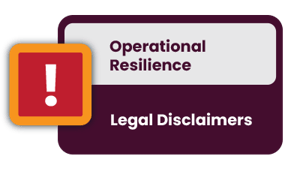Marina Bay Sands' Operating Environment
 Author's Comment:
Author's Comment:
Understanding Marina Bay Sands (MBS )'s unique operating environment is essential to fully appreciate this chapter's objective. However, as a practitioner, you may find the content of this chapter too high-level for OR implementation. Note that OR will require the implementation to include the external environment.
Knowing the various internal and external factors that shape its operating landscape and influence its ability to deliver consistent, high-quality services. This context is critical for practitioners seeking to implement a practical operational resilience framework based on the principles outlined in ISO 22316 and BCM Institute's proprietary OR planning methodology.
The framework highlights the importance of situational awareness and adaptive capacity—core principles that underpin an organisation's ability to build and sustain resilience in a dynamic and complex operational landscape.
Marina Bay Sands' Operating Environment

 Marina Bay Sands (MBS), a world-renowned integrated resort, operates within a dynamic and multifaceted environment.
Marina Bay Sands (MBS), a world-renowned integrated resort, operates within a dynamic and multifaceted environment.
Various internal and external factors shape its operating landscape and influence its ability to deliver consistent, high-quality services.
Understanding this environment is crucial for implementing a practical operational resilience framework, as outlined in ISO 22316.
This framework emphasises situational awareness and adaptive capacity as key principles of organisational resilience.
This chapter explores MBS's operating environment, focusing on the economic, regulatory, technological, and physical contexts that define its resilience planning.
Economic Context
Tourism Dependency
As a premier destination in Singapore, the Marina Bay Sands (MBS) relies heavily on global tourism. Fluctuations in tourist arrivals due to economic downturns, pandemics, or geopolitical tensions can significantly impact its revenue streams.
Revenue Diversification
While tourism is central, MBS has diversified its revenue sources through gaming, retail, dining, and large-scale events. This diversification enhances resilience by mitigating risks associated with a single revenue stream.
Global Competition
MBS operates in a competitive global landscape, with rival integrated resorts vying for market share. Maintaining its status as a preferred destination requires continuous innovation and operational excellence.
Regulatory Context
Industry-Specific Regulations
MBS functions within tightly regulated industries, including gaming, hospitality, and event management. Compliance with Singapore’s strict regulatory framework is non-negotiable in maintaining its licenses and reputation.
Data Privacy and Security
As a global destination, MBS handles sensitive customer and corporate data. Adherence to data protection regulations, such as Singapore’s Personal Data Protection Act (PDPA), is essential to safeguarding trust and avoiding legal repercussions.
Health and Safety Standards
The COVID-19 pandemic has underscored the importance of stringent health protocols. MBS must continuously adapt to evolving public health guidelines to ensure the safety of guests and staff.
Technological Landscape
Operational Technology
Technology underpins almost every aspect of MBS’s operations, from guest reservations and gaming systems to infrastructure management. The integration of advanced technologies enhances operational efficiency but also introduces cybersecurity risks.
Digital Transformation
To stay competitive, MBS invests in digital transformation initiatives, such as AI-driven guest services and IoT-enabled facility management. These advancements enhance service delivery but necessitate robust IT resilience strategies to mitigate disruptions.
Cybersecurity Threats
As a high-profile target, MBS faces constant cybersecurity threats. A breach could compromise sensitive data, disrupt operations, and damage its reputation, emphasising the need for a comprehensive cybersecurity framework.
Physical and Environmental Context
Geographic Location
Situated along Singapore’s Marina Bay, MBS enjoys a prime location that attracts millions of visitors annually. However, this waterfront location also exposes it to physical risks such as flooding and severe weather events.
Infrastructure Dependencies
MBS relies on critical infrastructure, including transportation networks, power supply, and telecommunications. Disruptions in these systems can cascade into operational challenges, highlighting the importance of contingency planning.
Environmental Sustainability
As a leading organisation, MBS is committed to environmental sustainability. Balancing operational demands with eco-friendly initiatives is an ongoing challenge that impacts resilience strategies.
Stakeholders and Social Context
Diverse Stakeholders
MBS interacts with various stakeholders, including employees, vendors, regulators, and guests. Aligning their expectations and maintaining transparent communication is crucial for resilience.
Cultural Diversity
With a multicultural workforce and international clientele, MBS operates in a diverse and culturally rich environment. This diversity necessitates tailored communication and training to ensure alignment during periods of disruption.
Community Impact
MBS plays a significant role in Singapore’s tourism and economy. Its operational continuity is vital to its stakeholders and the broader community.
Aligning the Operating Environment with ISO 22316
ISO 22316 emphasises the importance of understanding an organisation’s operating environment to build resilience. For MBS, this involves:
- Situational Awareness: Continuously monitor economic, regulatory, and technological changes.
- Risk Assessment: Identifying and mitigating risks associated with its physical location and infrastructure dependencies.
- Stakeholder Engagement: Fostering collaboration with internal and external stakeholders to ensure alignment in resilience planning.
By integrating these principles, MBS strengthens its ability to adapt to disruptions and maintain operational continuity.
Summing Up ...
Marina Bay Sands operates in a complex and interdependent environment that demands a proactive approach to operational resilience.
By understanding its economic, regulatory, technological, physical, and social contexts, MBS can design and implement a resilience framework that aligns with ISO 22316.
This foundational understanding prepares MBS to navigate disruptions effectively and reinforces its reputation as a world-class integrated resort.
The subsequent chapters will explore how this knowledge informs the development and execution of MBS’s operational resilience framework.
More Information About Blended Learning OR-5000 [OR-5] or OR-300 [OR-3]
To learn more about the course and schedule, click the buttons below for the OR-3 Blended Learning OR-300 Operational Resilience Implementer course and the OR-5 Blended Learning OR-5000 Operational Resilience Expert Implementer course.
 |
 |
 |
 |
 |
![[BL-OR] [3-4-5] View Schedule](https://blog.bcm-institute.org/hs-fs/hubfs/hub_generated/resized/e4287b59-1a43-4e10-8e43-c73b27b3ca39.png?width=172&height=50&name=e4287b59-1a43-4e10-8e43-c73b27b3ca39.png) |
![[BL-OR] [3] FAQ OR-300](https://blog.bcm-institute.org/hs-fs/hubfs/hub_generated/resized/294e989f-8613-4bf3-96a5-a89408cfb9ca.png?width=150&height=150&name=294e989f-8613-4bf3-96a5-a89408cfb9ca.png) |
 |
|
 |
 |
 |







![[OR] [MBS] [E1] [C6] Key Characteristics of MBS](https://no-cache.hubspot.com/cta/default/3893111/6a510f94-0f92-413e-aeeb-f4bb6d95167d.png)







![Email to Sales Team [BCM Institute]](https://blog.bcm-institute.org/hs-fs/hubfs/hub_generated/resized/850988ce-aa7d-4953-95cf-797635341edd.png?width=100&height=100&name=850988ce-aa7d-4953-95cf-797635341edd.png)

